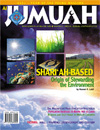Insult and Injury

"And the slaves of the All-Merciful are those who walk upon earth modestly. And when the ignorant address them, they speak in words of peace" [Quran 25:63]
The desire to belong can be great. The power of acceptance and the haplessness of those on the outside is perhaps no more obvious than in our public schools. As the thinking in education circles goes, the public schooling sector has only recently begun to acknowledge the power of peer pressure in defining proper standards of belonging and coolness.
Noted computer programmer Richard Brodie argues that immersion within one culture tends to be a "sink or swim proposition." Individuals, especially adolescent students, are invariably forced to choose between succumbing to peer pres- sure, by conforming to standards of dress and rhetoric they otherwise would not have chosen, or abstaining from the pressure to conform and thus struggling with the "extremely uncomfortable feeling of being surrounded by people who think you're crazy or inadequate."
'And when the ignorant address them, they speak in words of peace." In these splendid concluding verses of Surah al-Furqan, Allah describes in great detail important characteristics of those whom He, the All-Merciful, has declared as His slaves. Among their distinguishing characteristics is an ability to refrain from speaking ignorantly and impudently, and, moreover, to respond to the ignorant and impudent by using positive words of peace.
The Arabic term used to characterize the ignorant is jaahil, an extremely complex term that has generated much discussion and controversy over the nature of its meaning and the proper targets of its application in modern-day usage. Jaahil means liter- ally "ignorant," but its connotations in Muslim lands include illiteracy, a lack of manners, and general bad behavior. In the ayah cited here, Allah is distinguishing Muslims from jaahil folk on the basis of their character. From this verse, we may derive at least three important, interconnected lessons about patience, humility, and kind- spiritedness or magnanimity.
Patience
We've all been on the receiving end of an insult, or on the wrong side of a particularly rude remark. Among the many lessons derived from this verse is to absorb those mean-spirited words and have the patience not to react in the same vile manner. Depending on how bad you may have been insulted, the desire to respond in kind can be severe.
Yet Allah exhorts us to respond in quite an opposite manner, with words of peace in order to defuse hostilities. At the same time, this does not mean one should let mean-spirited comments pass without response. Depending on the context, you can or even should respond, however, the point here is to avoid responding in a way typical of those who are ignorant and unmindful of God.
In addition to the great patience involved in refusing to respond in kind to insults and harsh words, such an action on our part as believers involves a great deal of humility.
Humility
"You are stupid." For many of us, being called stupid evokes a great deal of anger and indignation. We passionately hope to come to the defense of our intellect, and the speed with which we reply often leaves no room for reflection about the words we utter.
But to avoid lowering the level of discussion by responding to an insult with an even greater insult is the goal. This takes much more than a touch of humility to refrain from levying a similarly mean-spirited remark in response. Instead, we learn from this ayah that we should, when possible, engage in constructive dialogue and not in a mean-spirited exchange of insults. The prerequisite of ignoring an insult, however, is humility, a quality almost completely debased in popular culture.
Magnanimity
An additional lesson we derive from this ayah is the concept of magnanimity, or absorbing whatever mean spiritedness comes your way and pardoning its sender, even with, perhaps, a smile on your face. "They respond with words of peace." That Allah is characterizing His slaves by highlighting their positive reactions to negativity indicates that our natural disposition should be one of kindness and humility. Such a disposition makes it necessary for us to generate the will and desire to pardon those who direct negative comments our way and, instead, respond in ways that earn us the pleasure of Allah.
Magnanimity is that combination of selflessness, humility, and patience, which enables us to overlook offensive comments and muster up the will to respond with positivity.
Patience, humility, and magnanimity, are just three lessons out of countless ones we can derive from this one verse. Together, they contribute to the elevation of our character and the development of a moral framework by which we may distinguish ourselves from others as the slaves of Allah.
*****
Excerpted from "Strait Talk for Young Adult - Insult and Injury" by Abdul Aziz Ahmed.
Article provided by Al Jumuah Magazine, a monthly Muslim lifestyle publication, which addresses the religious concerns of Muslim families across the world.
To subscribe please visit https://www.aljumuah.com/subscription


















